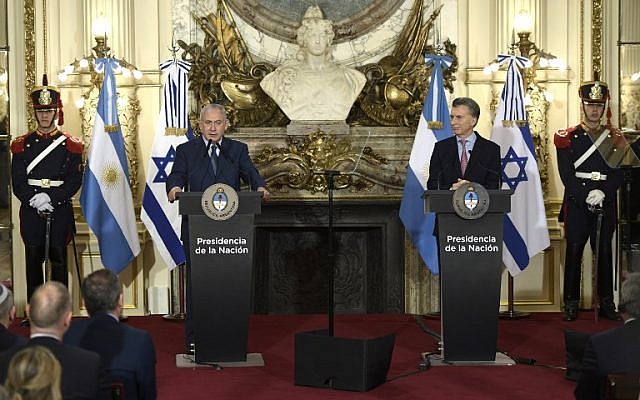FRESH AIR
UPDATES
Israeli PM’s historic visit to Latin America
September 14, 2017 | Sharyn Mittelman

Israeli Prime Minister Benjamin Netanyahu arrived in Argentina on Monday – the first visit by an Israeli leader to the region since Israel’s creation in 1948. Netanyahu is also visiting Colombia and Mexico before travelling to New York, where he will address the UN General Assembly next week.
The visit to Latin America reflects Israel’s new approach to foreign policy as it looks beyond its traditional relationships with Western nations to focus more on countries in Africa, Asia and Latin America. Netanyahu heralded the historic visit to Latin America as “the dawn of a new era…”
Prior to the election of Argentinian President Mauricio Macri in 2015, relations between Argentina and Israel had been strained for sometime. Old wounds include the 1994 bombing of the Asociación Mutual Israelita Argentina Jewish community center in Buenos Aires (known as “AMIA”) – that killed 85 people, and the 1992 bombing on the Israeli embassy in Buenos Aires that killed 29 people – the deadliest ever attack on an Israeli mission. Both bombings are believed to have been carried out by Lebanese terror group Hezbollah under orders form Iran.
Argentinian leaders have been accused of covering up the responsibility of Hezbollah and Iran for the AMIA attack. Most infamously Jewish prosecutor Alberto Nisman was mysteriously found dead with a gunshot wound to his head in 2015, hours before he was to present evidence that would have implicated then-President Cristina Fernandez de Kirchner and Foreign Minister Hector Timerman for having allegedly orchestrated a secret deal to cover up Iran’s role in the AMIA bombing. It is widely believed that Nisman was murdered. A new toxicology report on the body Nisman found that ketamine and clonazepam were in his blood at the time of his death, Argentinian federal criminal prosecutor Ricardo Saenz announced in August. The Argentinian Supreme Court has also decided to move forward with an investigation charging Kirchner and Timerman with treason.
Argentina is also known to having provided refuge to Nazis after WWII, including top Nazi war criminals Adolph Eichmann and Joseph Mengele. The Mossad’s capture of Eichmann in 1960 and subsequent trial, is also said to have strained relations between the two nations – as Argentina regarded this as a breach of its sovereignty.
However, Argentinian President Macri has turned a new page in relations with Israel. Macri has not only expressed support for Israel and a desire to improve diplomatic and economic relations, but has also committed to uncovering the truth about the AMIA attack, as well as Argentina’s role as a refuge for Nazis after the Holocaust.
Reflecting this change, during his meeting with Netanyahu on September 12, Macri delivered to Netanyahu around 140,000 secret files and photographs from 1939-1950 – which reveal Argentina’s role in providing help to Nazi war criminals.
On his visit to Argentina, Netanyahu attended memorials at the site of the terrorist bombings and said that, “Iran stood behind these events.” He added: “Israel has been and will continue to be a spearhead in the struggle against global terrorism, and we will continue to act with determination, in various ways, to defend ourselves from the aggression and terrorism of Iran and against terrorism in general.”
Three Israelis whose loved ones were killed accompanied Netanyahu from Israel for the memorial. Netanyahu called for the perpetrators of the AMIA attack to be prosecuted. “It is time to hold Iran fully responsible in a public and final way. It is time to get justice for the victims. It is time to denounce the perpetrators,” he said.
The Israeli PM told reporters that Hezbollah’s activity in Latin America would be on the agenda in meetings with leaders from Argentina, Colombia and Mexico.
At his meeting with Netanyahu, Macri said that Argentina would work “together with Israel and our allies against terrorism.” He also announced that Vice President Gabriela Michetti will visit Israel.
Latin American countries are also interested in pursuing stronger relations with Israel for their own self-interest – as Israel is a leader in areas including agriculture, water management, cyber defence and counter-terrorism, opening numerous areas of potential mutually beneficial cooperation.
At the meeting between Macri and Netanyahu, three agreements were signed: one for cooperation in Public and Internal Security and two on mutual assistance in customs and social security matters.
Trade between Israel and Latin American countries has significant room for growth. According to the Israel-Latin America Chamber of Commerce, trade with Latin America reached US$2.8 billion in 2015, but this represents only 4% of Israel’s overall trade. Israel’s largest trading partner in Latin America is Brazil, with trade in 2015 reaching US$903 million, followed by Mexico at US$543 million and Argentina at US$259 million.
Today, Israel’s strongest allies in Latin America include Argentina, Colombia and Mexico, Paraguay and Panama. In contrast, during Israel’s 2014’s war with Gaza (Operation Protective Edge), five Latin American countries recalled their ambassadors: El Salvador, Brazil, Chile, Ecuador and Peru.
While in Argentina, Netanyahu also met with Paraguayan President Horacio Cartes. Netanyahu arrived in Colombia on Wednesday where Israel was thanked by Colombian President Juan Manuel Santos for promoting peace in his country, noting Israel’s efforts to help defuse landmines. Santos and Netanyahu also signed a tourism cooperation agreeement. In Mexico, Netanyahu will meet with President Enrique Pena Nieto and is planned to sign joint agreements on space, aviation, communications and development cooperation. Netanyahu will also meet with Panamanian President Juan Carlos Varela on the sidelines of the UN General Assembly meeting in New York next week.
Sharyn Mittelman
Tags: Israel
RELATED ARTICLES

He survived Bondi. Now he’s fighting back: Arsen Ostrovsky addresses AIPAC conference

US Middle East strategy amid regional instability: Dana Stroul at the Sydney Institute





















